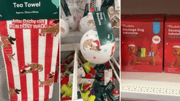This unmissable clue reveals major health trend sweeping food products in Australia
By
Danielle F.
- Replies 4
As shoppers wander around the aisles of their local supermarkets, customers might notice something cropping up food products everywhere.
Food items have seen a rapid increase in this department, regardless of a product's price tag.
Once upon a time, protein was the domain of bodybuilders and gym junkies.
Now, protein is being packed into just about everything, and the trend is impossible to ignore.
Shoppers may find 'high-protein' labels on chips, chocolate bars, crackers, yoghurts, and even drinks.

Social media has also been awash with high-protein recipes, and supermarket shelves groan under the weight of protein-enriched everything.
Why is there a sudden obsession with the said nutrient?
According to dietitian Susie Burrell, protein's rise to becoming an 'it-nutrient' status has been long overdue.
'Protein has received an increasing amount of attention in recent years due to its positive association with muscle mass, weight and appetite control,' Burrell explained.
As health professionals pay attention to the trend, major food brands have been keeping up with Australia's protein craze.
Restaurant chain Subway recently revamped its menu to include various wraps with 34 grams of protein.
'There's no denying the protein health trend we're seeing across Australia,' Rodica Titeica, Subway's Director of Marketing for Australia and New Zealand, stated.
'Consumers are prioritising options that deliver on both flavour and functionality.'
While Millennials and Gen Z are keen on protein, seniors are also tuning in to the benefits of protein.
Burrell emphasised that natural protein sources like lean meat, fish, eggs, dairy, legumes, and whole grains are best.
'Many protein-fortified foods are ultra-processed,' Burrell added.
'Yoghurt will always beat protein-fortified pudding pretending to be yoghurt.'
'Protein-enriched' food products like pizza, chocolate, and chips often contain higher calories and are not as healthy as they seem.
Protein is more than just building muscle.
Maintaining muscle mass is also a crucial factor for mobility, strength, and overall health.
For women, especially those approaching or going through perimenopause and menopause, protein is even more important.
'More attention is being given to perimenopause and the importance of a higher-protein diet to help optimise metabolic rate,' Burrell said.
Research from Sydney University suggested that tweaking the balance of macronutrients, such as increasing protein, could lessen or prevent weight gain and muscle loss during this transition.
Burrell recommended at least 1g of protein per kilo of body weight daily.
However, optimal amounts for women in their 40s and beyond may be closer to 1.4 to 1.6 g per kilo or 100 to 120 g a day.
While protein is important, it's not a case of 'the more, the merrier'. Consuming more than 2 g of protein per kilo of body weight is unnecessary for most people.
Excess protein could also put a strain on a person's kidneys.
It's great to see more options for protein, which is vital for ageing.
On the other hand, it's important to make savvy and healthy decisions.
Here are some tips to get enough protein in a healthy way:

Have you noticed the explosion of protein-laden products at your local supermarket? Have you tried any of the new high-protein snacks or meals? Do you feel better when you eat more protein, or is it just clever marketing? Share your thoughts and experiences in the comments below!
Food items have seen a rapid increase in this department, regardless of a product's price tag.
Once upon a time, protein was the domain of bodybuilders and gym junkies.
Now, protein is being packed into just about everything, and the trend is impossible to ignore.
Shoppers may find 'high-protein' labels on chips, chocolate bars, crackers, yoghurts, and even drinks.

Health-conscious individuals have been consuming protein-enhanced food products recently. Image Credit: Pexels/Hobi Industri
Social media has also been awash with high-protein recipes, and supermarket shelves groan under the weight of protein-enriched everything.
Why is there a sudden obsession with the said nutrient?
According to dietitian Susie Burrell, protein's rise to becoming an 'it-nutrient' status has been long overdue.
'Protein has received an increasing amount of attention in recent years due to its positive association with muscle mass, weight and appetite control,' Burrell explained.
As health professionals pay attention to the trend, major food brands have been keeping up with Australia's protein craze.
Restaurant chain Subway recently revamped its menu to include various wraps with 34 grams of protein.
'There's no denying the protein health trend we're seeing across Australia,' Rodica Titeica, Subway's Director of Marketing for Australia and New Zealand, stated.
'Consumers are prioritising options that deliver on both flavour and functionality.'
While Millennials and Gen Z are keen on protein, seniors are also tuning in to the benefits of protein.
Burrell emphasised that natural protein sources like lean meat, fish, eggs, dairy, legumes, and whole grains are best.
'Many protein-fortified foods are ultra-processed,' Burrell added.
'Yoghurt will always beat protein-fortified pudding pretending to be yoghurt.'
'Protein-enriched' food products like pizza, chocolate, and chips often contain higher calories and are not as healthy as they seem.
Protein is more than just building muscle.
Maintaining muscle mass is also a crucial factor for mobility, strength, and overall health.
For women, especially those approaching or going through perimenopause and menopause, protein is even more important.
'More attention is being given to perimenopause and the importance of a higher-protein diet to help optimise metabolic rate,' Burrell said.
Research from Sydney University suggested that tweaking the balance of macronutrients, such as increasing protein, could lessen or prevent weight gain and muscle loss during this transition.
Burrell recommended at least 1g of protein per kilo of body weight daily.
However, optimal amounts for women in their 40s and beyond may be closer to 1.4 to 1.6 g per kilo or 100 to 120 g a day.
While protein is important, it's not a case of 'the more, the merrier'. Consuming more than 2 g of protein per kilo of body weight is unnecessary for most people.
Excess protein could also put a strain on a person's kidneys.
It's great to see more options for protein, which is vital for ageing.
On the other hand, it's important to make savvy and healthy decisions.
Here are some tips to get enough protein in a healthy way:
- Start your day with protein: Eggs, Greek yoghurt, or a handful of nuts with your breakfast can help you feel fuller for longer.
- Include a protein source at every meal: Lean meat, fish, tofu, legumes, and dairy are all excellent choices.
- Snack smart: Instead of reaching for a 'protein bar,' try cottage cheese, a boiled egg, or a small tin of tuna.
- Read the labels: Not all 'high-protein' foods are created equal. Check for added sugars, fats, and other additives.
Key Takeaways
- Protein has become a major trend on Australian supermarket shelves, appearing in a wide range of food products.
- Health professionals and major brands alike have highlighted the benefits of protein, especially for muscle mass, weight management, and appetite control.
- There has been a growing focus on higher protein intake for women, particularly during perimenopause.
- Natural sources of protein, like meat, fish, eggs and dairy, are preferable to ultra-processed, protein-fortified foods consumed in excessive amounts.







